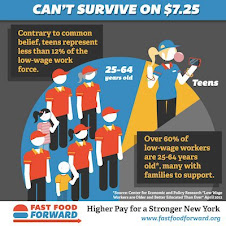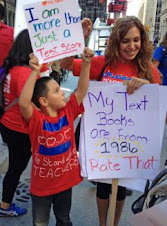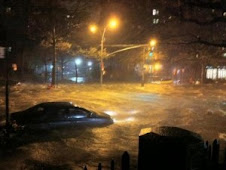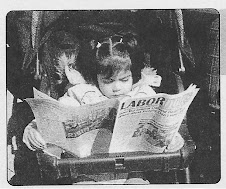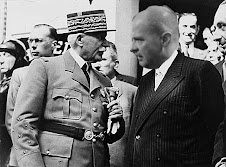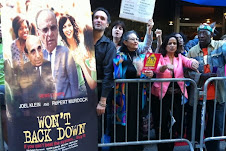REAL PARENTS REACT TO ASTROTURF FILM FOR ALEC-PUSHED AGENDA As reported in the Hollywood Reporter, real New York parents protested the "Won't Back Down"'s September 23, 2012 New York premiere at the Ziegfeld Theater, the city's last classic showcase theater for films. Click on the video at right for New Yorkers for Great Public Schools and the parents' protest. The film had its nationwide theatrical opening on September 28. Mary Bottari and Sara Jerving in their September 19 story in the Center for Media and Democracy's PR Watch deals with the American Legislative Exchange Council's (ALEC) promotion of parent trigger laws used in "Won't Back Down."
THE POLITICAL BACKDROP TO NBC'S EDUCATION NATION 2012 The Philip Anschutz and Rupert Murdoch bank-rolled agitprop pro-parent ideological trigger law tear jerker, "Won't Back Down" has been used by Michelle Rhee as a centerpiece for a film-promo-tour tie-in. What's better company for that ideological screed of a film-promo-tour than an NBC sponsored love fest of education reformers/deformers?
A CRACK IN THE TEACHER BASHING MANTRA As a New Jersey pro-public school parent and blogger noted, in her blog Mother Crusader blog, cross posting "We’re the real parents, and we won’t back down!" from WHYY's News Works, MSNBC's Alex Wagner slid in a reference to a Stanford study deflating the glories of charter schools.
The WHYY/NewsWorks piece further said,
The protest did not go unnoticed. Inside the premiere NBC News President Steve Capus made note of the "noisy welcome" attendees received, and claimed that he wants the discussion. Then why was NBC's parent engagement panel bereft of actual public school parents who don't want their children's schools closed or turned into a charter?
To date the research has not shown that closing a public school and reopening it as a charter will provide parents with the change they seek. One bright spot at the panel discussion was when the moderator, MSNBC's Alex Wagner, quoted from a Stanford University study that showed that only 17 percent of charters fair better than comparable public schools, while 37 percent actually fair worse and the remaining charters have similar outcomes.
CHOOSY MEDIA GUESTS, RIGGED PANELS
Education Nation was an unfortunate affair, with its banning of Rockaway Wave correspondent Norm Scott and with stacking of panels with pro-charter school zealots.
Why the slant? The corporate outlets that NBC proudly allows as guests, in their "cross-network" geniality. These outlets assert professional neutrality. But a critical mind recognizes the reality that much of their "coverage" of education topics amounts to subtle propaganda for education deform / corporate privatization of education.
This banning of non-major outlet journalists is an outrage worthy of a big stink.
DESPERATE FIRST LADY PHOTO PLACEMENT ALERT
While we're on the topic of exploiting images and messages, at the blog Lil Kid Things, check out the face on giant placard placed on the stage of Won't Back Down event. Looks a lot like First Lady Michelle Obama. Are the Won't Back Down backers trying to imply that the first lady endorses parent triggers or charter schools?
We can bet that the Michelle Obama picture's getting plenty of use on Rhee's cross-country parent trigger / Won't Back Down promo tour.
Here's one parent's post on the above article about the film. She discusses her town's fight-back against a charter school invasion and its planned stripping parents of the democratic rights of any input in school governance.
Please understand that this film is part of a very well-funded movement right now to privatize public education. The “parent trigger” laws that the film promotes have never been successfully implemented, because they are a legal quagmire, involving a small number of parents at one school appropriating something that is owned by the taxpayers as a whole and giving management of it to a private organization. This isn’t a parent takeover, but a private takeover. The laws aren’t designed to give parents more power in the end, in fact, in Adelanto CA (where the first parent trigger may actually take place after a protracted legal battle) parents tried to rescind their signatures from the trigger petition but a judge ruled that they couldn’t.EDUCATING MAGGIE AND MAGGIE LECTURING THE TEACHERS UNIONS
There are tremendous corporate interests behind this movement.
My state PTA board recently voted to oppose a charter school ballot measure, because it would strip local, citizen, and parental control away from public schools.
When my children weren’t yet in school, I worried about our local public schools. Now that they are in 6th and 4th grade, I can look back and see that the vast majority of the teachers are trying incredibly hard, often with children who have tremendous challenges at home. If you are an involved parent and you bring your children to school prepared to learn, most of the time they will do very well.
New Yorkers for Great Public Schools, a parents' group has released a great video, “Educating Maggie.” (Video uploaded at right.) Maggie, herself, has a word or two of instruction for public teachers and their unions. She now is posturing as a self-proclaimed leftist, chiding labor unions:
In the interview, Gyllenhaal said she comes from a family of proud leftists, and that she herself is staunchly pro-union. However, she also suggested that the quickness with which critics have come out to blast “Won’t Back Down” as a crack against the labor movement shows intolerance among the pro-union camp. “Can we not even take a look at ways that the teachers union isn't functioning without being called anti-union?” she said.Gyllenhaal's line falls in line with some conservative pundits who have tried to claim to be pro-teacher and to play up imaginary divisions in unions, over divisions between teachers that favor the test and punish mantra and those questioning the shifts in educational policy.
Potential viewers might not care either way. Since the film’s opening on Friday, reviews of “Won’t Back Down” have been mostly brutal. USA Today said it is “repeatedly focused on a superficial depiction of the powerful teachers union,” while the Washington Post called it “so didactic that viewers are likely to feel less uplifted than lectured.”
LESS STREET CRED THAN KLEIN, MORE LIKE BLACK
But who is Maggie Gyllenhaal to lecture teachers about conditions of public schools or the experience of learning or teaching in public schools. When we look at her biography we see that her parents are a film director and a film producer. Her father hails from Swedish nobility. Her school experience? Her secondary school years were at the Harvard-Westlake School, a prep school of the exclusive international G 20 classification of top “independent schools” --euphemism for super-elite prep schools.
Let's go back in time to 2010, when Cathie Black, Duchess of Bridgewater, Connecticut succeeded mere citizen Joel Klein. Much was made of how she had never any prior contact with an institution of public education. Compare Gyllenhaal and Black with Joel Klein, who at least attended public schools before he entered college.
Harvard-Westlake School, 2011-2012 tuition of 30,350 … what kind of test scores do you think Maggie's school has had? “In 2010, 566 Harvard-Westlake students took 1,736 Advanced Placement tests in 30 different subjects, and 90% scored 3 or higher.” --Wikipedia Harvard-Westlake School, whose “class of 2011 had 90 students out of approximately 280 receive National Merit recognition, with 28 students receiving consideration as National Merit Semifinalists.” --Wikipedia Gee, I wonder what kinds of student-teacher ratios her school had.
WON'T BACK DOWN'S FALLING STOCK
Professional critics at Rotten Tomatoes.com generally pan the film; an aggregate of 33% give positive reviews of Won't Back Down.
David Rooney at Hollywood Reporter wrote that the film is a "pedestrian and insultingly tendentious drama."
Initially, the film sufficiently pulled at the heartstrings of the audience and produced a 79% vote on the audience meter (as of Thursday), today the film has sunk to 58% on the audience.
Per Internet Movie Database, the film is floundering with an out-right poor rating of 4.9, a rating seldom scored by the better half of top Hollywood directors and actors. At metacritic.com “Won't Back Down” is bombing at 43 on a 100 scale, down there with “Hotel Transylvania,” and well below “Trouble with the Curve.” GYLLENHAAL'S UNCOMFORTABLE THANKSGIVING DINNER
The New York Observer reports that the film's stars "don't back down from the film's politics"
“You don’t want a movie to feel like it’s an issue thing. You want it to feel like a human drama. I mean Oscar Isaac’s character, his whole narrative is about someone who’s a big union believer and is struggling with that in the course of the movie.”Well, we can feel sorry for Gyllenhaal's upcoming Thanksgiving. Maggie, your film is a tool for teacher bashing, for pulling public resource from public school and for enabling the further privatization of public schools. I just feel so sorry for you. Your progressive family will wax about how great Karen Lewis has been for the nation's teachers, and you will say ...?
The film’s stars, wearing grave political faces in addition to red carpet gowns, were ardent about education reform but wary of appearing anti-union. Ms. Gyllenhall said that she came from “the most progressive left. I wouldn’t be allowed to go home for Thanksgiving if I made an anti-union movie.”
MORE NICE RESOURCES ON WON'T BACK DOWN AND ITS ISSUES:
Liza Featherstone at the journal "Dissent," ""Empowerment" Against Democracy: Tinseltown and the Teachers' Unions", September 26, 2012 An excerpt:
Jamie crows to a throng of cheering parents—but democracy is the enemy. Getting rid of representative government and calling in a private entity to handle things, in our current Opposite Day political moment, represents a glorious triumph of people power. The “parent trigger” invites parents to use their vote to give up their vote—that is, to be enormously powerful for one short moment of direct democracy, which they will use to dispose, in the long run, with the “public” part of public school, and thus with any actual power over their children’s education.----Liza Featherstone, a real, not fictional, NYC public school parent, as linked at EdNotes.










